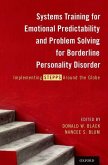Monica K Miller, Mia A Holbrook, Logan A Yelderman, Kylie Kulak
Society, Science, and Problem-Solving Courts
Monica K Miller, Mia A Holbrook, Logan A Yelderman, Kylie Kulak
Society, Science, and Problem-Solving Courts
- Gebundenes Buch
- Merkliste
- Auf die Merkliste
- Bewerten Bewerten
- Teilen
- Produkt teilen
- Produkterinnerung
- Produkterinnerung
Problem-solving courts are special courts that do not simply punish offenders, but employ other justice and psychology principles to help solve the underlying social issues that contributed to the crime. The prevalence and practice of problem-solving courts vary widely around the world. Society, Science, and Problem-Solving Courts lays out the societal and scientific factors that explain the development of problem-solving courts, and chart a path for their future.
Andere Kunden interessierten sich auch für
![The Psychology of the Supreme Court The Psychology of the Supreme Court]() Lawrence S WrightsmanThe Psychology of the Supreme Court53,99 €
Lawrence S WrightsmanThe Psychology of the Supreme Court53,99 €![Clinicians in Court Clinicians in Court]() Allan Edward BarskyClinicians in Court81,99 €
Allan Edward BarskyClinicians in Court81,99 €![Oxford Handbook of Emotion, Social Cognition, and Problem Solving in Adulthood Oxford Handbook of Emotion, Social Cognition, and Problem Solving in Adulthood]() Oxford Handbook of Emotion, Social Cognition, and Problem Solving in Adulthood223,99 €
Oxford Handbook of Emotion, Social Cognition, and Problem Solving in Adulthood223,99 €![Systems Training for Emotional Predictability and Problem Solving for Borderline Personality Disorder Systems Training for Emotional Predictability and Problem Solving for Borderline Personality Disorder]() Systems Training for Emotional Predictability and Problem Solving for Borderline Personality Disorder127,99 €
Systems Training for Emotional Predictability and Problem Solving for Borderline Personality Disorder127,99 €![Counselling Young People Counselling Young People]() Louise PorterCounselling Young People187,99 €
Louise PorterCounselling Young People187,99 €![Psychology: a Problem-solving Approach--Teacher's Manual Psychology: a Problem-solving Approach--Teacher's Manual]() Donald McEwen JohnsonPsychology: a Problem-solving Approach--Teacher's Manual45,99 €
Donald McEwen JohnsonPsychology: a Problem-solving Approach--Teacher's Manual45,99 €![The Psychoanalytic Study of Society, V. 19 The Psychoanalytic Study of Society, V. 19]() The Psychoanalytic Study of Society, V. 1952,99 €
The Psychoanalytic Study of Society, V. 1952,99 €-
-
-
Problem-solving courts are special courts that do not simply punish offenders, but employ other justice and psychology principles to help solve the underlying social issues that contributed to the crime. The prevalence and practice of problem-solving courts vary widely around the world. Society, Science, and Problem-Solving Courts lays out the societal and scientific factors that explain the development of problem-solving courts, and chart a path for their future.
Hinweis: Dieser Artikel kann nur an eine deutsche Lieferadresse ausgeliefert werden.
Hinweis: Dieser Artikel kann nur an eine deutsche Lieferadresse ausgeliefert werden.
Produktdetails
- Produktdetails
- Verlag: Oxford University Press
- Seitenzahl: 352
- Erscheinungstermin: 4. Dezember 2024
- Englisch
- Abmessung: 242mm x 168mm x 28mm
- Gewicht: 662g
- ISBN-13: 9780190059804
- ISBN-10: 019005980X
- Artikelnr.: 72119602
- Herstellerkennzeichnung
- Libri GmbH
- Europaallee 1
- 36244 Bad Hersfeld
- gpsr@libri.de
- Verlag: Oxford University Press
- Seitenzahl: 352
- Erscheinungstermin: 4. Dezember 2024
- Englisch
- Abmessung: 242mm x 168mm x 28mm
- Gewicht: 662g
- ISBN-13: 9780190059804
- ISBN-10: 019005980X
- Artikelnr.: 72119602
- Herstellerkennzeichnung
- Libri GmbH
- Europaallee 1
- 36244 Bad Hersfeld
- gpsr@libri.de
Monica K. Miller joined the University of Nevada, Reno in 2004 after receiving her J.D. and PhD from the University of Nebraska system. Her interests involve the application of psychological theories and justice principles to laws, policies, and court procedures. Specifically, she is interested in social cognitive biases (i.e., gender and religion-based prejudice) and individual differences in moral and legal decisions (e.g., jury decisions); how the law regulates the family; how community sentiment and science relate to law; how problem-solving courts address social issues; and the well-being of those who interact with the legal system (including the use of therapy dogs). Mia A. Holbrook joined the University of Nevada, Reno in 2019 after receiving her PhD in Criminal Justice and Criminology from Washington State University. Dr. Holbrook's research interests and expertise lie in evidence-based practices and model fidelity; program and policy evaluation; equitable practices in the criminal justice system; problem-solving and specialty courts; organizational trust & collaboration; perceptions & attitudes; and instrument validation. Logan A. Yelderman earned his BA in Psychology and Communication Specialist in 2011 from Baylor University and his PhD in Social Psychology in 2016 from the University of Nevada, Reno. His research interests involve topics at the intersection of social psychology, religion, and law with an emphasis on legal decision-making. His research typically includes experimental and non-experimental designs related to jury and parole decision-making, juvenile drug courts, religious fundamentalism, and the interplay between cognition and emotion. Kylie Kulak earned her BA in Psychology at Fresno State University in 2020, her MS in Psychology at Arizona State University in 2022, and is currently a Social Psychology doctoral student at the University of Nevada, Reno. Her research interests focus on emotions and extralegal factors that can influence jury decision-making, such as race and gender. She also has an interest in the therapeutic effects of facility dogs in the legal system.
* Section 1: Introduction to Problem-Solving Courts
* Chapter 1: Society, Science, and Problem-solving Courts in the U.S.
and Abroad
* Chapter 2: Overview of the Types of Problem-Solving Courts
* Mia A. Holbrook and Mary Dhondt
* Section 2: The Science of Problem-Solving Courts
* Chapter 3: The Justice Principles of Problem-Solving Courts
* Logan A. Yelderman, Mia A. Holbrook, Jennifer L. Lanterman, Alicia
DeVault, Monica K. Miller
* Chapter 4:The Psychology of Problem-Solving Courts
* Chapter 5: Scientific Methodology used in Evaluations and
Problem-Solving Courts
* Chapter 6: Effectiveness of Problem-Solving Courts
* Mia A. Holbrook and Mary Dhondt
* Section 3: Society and Problem-Solving Courts
* Chapter 7: When Law and Culture Collide
* Chapter 8: Problem-Solving Courts and the Social Mind-set Model
* Monica K Miller, Kylie Kulak, and Amber Westbrook
* Section 4: The Development (or Not) of Problem-solving Courts
* Chapter 9: Why Some Countries Have Problem-solving Courts
* Waleed Jami, Kylie Kulak, and Monica K. Miller
* Chapter 10: Why Some Countries Do Not Have Problem-solving Courts
* Section 5: Problem-solving Courts: Looking to the Future by Looking
at the Past
* Chapter 11: The Benefits (Pros) and Drawbacks (Cons) of
Problem-Solving Courts: A Scientific Understanding of Variations in
Perspectives Across Societies
* Conclusion
* Chapter 12: Society, Science, and Problem-solving Courts: Yesterday,
Today, and Tomorrow
* References
* Chapter 1: Society, Science, and Problem-solving Courts in the U.S.
and Abroad
* Chapter 2: Overview of the Types of Problem-Solving Courts
* Mia A. Holbrook and Mary Dhondt
* Section 2: The Science of Problem-Solving Courts
* Chapter 3: The Justice Principles of Problem-Solving Courts
* Logan A. Yelderman, Mia A. Holbrook, Jennifer L. Lanterman, Alicia
DeVault, Monica K. Miller
* Chapter 4:The Psychology of Problem-Solving Courts
* Chapter 5: Scientific Methodology used in Evaluations and
Problem-Solving Courts
* Chapter 6: Effectiveness of Problem-Solving Courts
* Mia A. Holbrook and Mary Dhondt
* Section 3: Society and Problem-Solving Courts
* Chapter 7: When Law and Culture Collide
* Chapter 8: Problem-Solving Courts and the Social Mind-set Model
* Monica K Miller, Kylie Kulak, and Amber Westbrook
* Section 4: The Development (or Not) of Problem-solving Courts
* Chapter 9: Why Some Countries Have Problem-solving Courts
* Waleed Jami, Kylie Kulak, and Monica K. Miller
* Chapter 10: Why Some Countries Do Not Have Problem-solving Courts
* Section 5: Problem-solving Courts: Looking to the Future by Looking
at the Past
* Chapter 11: The Benefits (Pros) and Drawbacks (Cons) of
Problem-Solving Courts: A Scientific Understanding of Variations in
Perspectives Across Societies
* Conclusion
* Chapter 12: Society, Science, and Problem-solving Courts: Yesterday,
Today, and Tomorrow
* References
* Section 1: Introduction to Problem-Solving Courts
* Chapter 1: Society, Science, and Problem-solving Courts in the U.S.
and Abroad
* Chapter 2: Overview of the Types of Problem-Solving Courts
* Mia A. Holbrook and Mary Dhondt
* Section 2: The Science of Problem-Solving Courts
* Chapter 3: The Justice Principles of Problem-Solving Courts
* Logan A. Yelderman, Mia A. Holbrook, Jennifer L. Lanterman, Alicia
DeVault, Monica K. Miller
* Chapter 4:The Psychology of Problem-Solving Courts
* Chapter 5: Scientific Methodology used in Evaluations and
Problem-Solving Courts
* Chapter 6: Effectiveness of Problem-Solving Courts
* Mia A. Holbrook and Mary Dhondt
* Section 3: Society and Problem-Solving Courts
* Chapter 7: When Law and Culture Collide
* Chapter 8: Problem-Solving Courts and the Social Mind-set Model
* Monica K Miller, Kylie Kulak, and Amber Westbrook
* Section 4: The Development (or Not) of Problem-solving Courts
* Chapter 9: Why Some Countries Have Problem-solving Courts
* Waleed Jami, Kylie Kulak, and Monica K. Miller
* Chapter 10: Why Some Countries Do Not Have Problem-solving Courts
* Section 5: Problem-solving Courts: Looking to the Future by Looking
at the Past
* Chapter 11: The Benefits (Pros) and Drawbacks (Cons) of
Problem-Solving Courts: A Scientific Understanding of Variations in
Perspectives Across Societies
* Conclusion
* Chapter 12: Society, Science, and Problem-solving Courts: Yesterday,
Today, and Tomorrow
* References
* Chapter 1: Society, Science, and Problem-solving Courts in the U.S.
and Abroad
* Chapter 2: Overview of the Types of Problem-Solving Courts
* Mia A. Holbrook and Mary Dhondt
* Section 2: The Science of Problem-Solving Courts
* Chapter 3: The Justice Principles of Problem-Solving Courts
* Logan A. Yelderman, Mia A. Holbrook, Jennifer L. Lanterman, Alicia
DeVault, Monica K. Miller
* Chapter 4:The Psychology of Problem-Solving Courts
* Chapter 5: Scientific Methodology used in Evaluations and
Problem-Solving Courts
* Chapter 6: Effectiveness of Problem-Solving Courts
* Mia A. Holbrook and Mary Dhondt
* Section 3: Society and Problem-Solving Courts
* Chapter 7: When Law and Culture Collide
* Chapter 8: Problem-Solving Courts and the Social Mind-set Model
* Monica K Miller, Kylie Kulak, and Amber Westbrook
* Section 4: The Development (or Not) of Problem-solving Courts
* Chapter 9: Why Some Countries Have Problem-solving Courts
* Waleed Jami, Kylie Kulak, and Monica K. Miller
* Chapter 10: Why Some Countries Do Not Have Problem-solving Courts
* Section 5: Problem-solving Courts: Looking to the Future by Looking
at the Past
* Chapter 11: The Benefits (Pros) and Drawbacks (Cons) of
Problem-Solving Courts: A Scientific Understanding of Variations in
Perspectives Across Societies
* Conclusion
* Chapter 12: Society, Science, and Problem-solving Courts: Yesterday,
Today, and Tomorrow
* References








